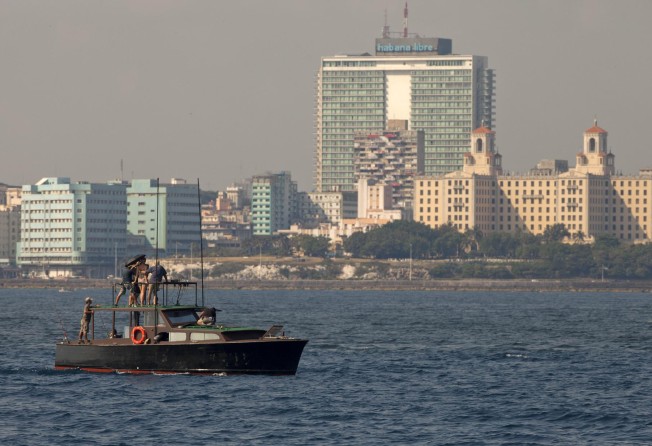Postcard: Havana

Rebels allied with a young Fidel Castro burst into the street outside Havana's Government Palace as soldiers loyal to strongman Fulgencio Batista rain gunfire from above. Steps away, Ernest Hemingway and a young journalist friend dive for cover behind a car.
An international film crew has been re-enacting this and other historic scenes in the streets of Havana for Papa, a biopic about the budding friendship between Hemingway and the reporter in the turbulent Cuba of the 1950s.
Those behind the Canadian-Cuban-American production say Papa is the first full-length feature film with a Hollywood director and actors to be shot in the country since the 1959 revolution. Decades of ill will between Cuba and the US, and Washington's 52-year-long embargo meant movies ostensibly set here - The Godfather Part II, 1990's Havana - were filmed in stand-in locations such as the Dominican Republic.
"It was an absolute passion to actually make it in Cuba where everything that is in the script happened, where the finca [farm] is where [Hemingway] lived, where his boat was, all the spots from the Morro castle to Cojimar where he fished," director Bob Yari says.
Papa came to Cuba under a US Treasury licence exempting it from most embargo restrictions: the movie qualifies as a documentary, since it depicts a firsthand account of real events here.
Although the title derives from the Nobel Prize-winning novelist's nickname, the film is based on an autobiographical script by Denne Bart Petitclerc (played by Giovanni Ribisi). Abandoned by his father as a young boy, Petitclerc fell in love with Hemingway's writing and later came to see him as a father figure. While working for the Miami Herald in the 1950s, he wrote a letter to the novelist professing his admiration. He didn't intend to send it, but his girlfriend dropped it in the mail.
For Papa, a reading room at the University of Havana library stood in for the Herald newsroom. Cuban extras milled about in slim ties and saddle shoes, long skirts and horn-rimmed glasses. Vintage typewriters clacked away. The scene retells the moment when Petitclerc, known as "Ed" in the movie, receives a phone call that at first he thinks is a prank.
"Good letter, kid," Hemingway says. "You like to fish?" And so the two strike up a friendship that would last until Hemingway's 1961 suicide.
The film crew secured access to some of Havana's most iconic locales, including the former Government Palace, now a museum celebrating Castro's revolution. They also secured permission to shoot inside Hemingway's former estate, Finca Vigia - today considered such a shrine that tourists are only allowed to peer in through the windows.
Adrian Sparks, who has played Hemingway on stage, says his movie role was a magical experience. "To play … where he's struggling with writer's block, I'm standing on exactly the square foot of ground that he stood on, with his typewriter in front of me. It wasn't acting, it was channelling," the star says. "It was just allowing him to come through."
There have been some only-in-Cuba moments of frustration. Among other things, in a country with a history of high-seas defections, even getting on a boat requires official approval - and when cast members' names were missing from a list one day, an open-water shoot was delayed. But the payoff was the opportunity to shoot in a city that has remained frozen in the 1950s, with American cars from the era readily available to provide a historic backdrop.
Petitclerc went on to a long career as a journalist and writer of books, TV shows and movies. He died in 2006, aged 76.
Hemingway lived in Cuba from 1939 to 1960, writing much of The Old Man and the Sea and other works here.
The two countries' affection for Hemingway is among the few things they agree on. "He was probably the most prominent American to make Cuba his home, and I think the people of Cuba to this day cherish him and love him," says Yari.
"Hopefully this film will become an addition to that component of bridging this gap between two cultures and two peoples that have drifted apart."
Associated Press